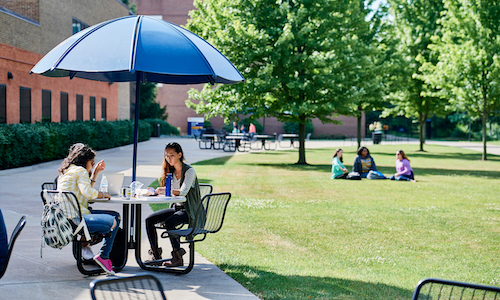
You may have heard that UM-Dearborn recently reshuffled some of its key student life-focused services, and Dean of Students Amy Finley will forgive you if you’re having trouble keeping a few of the details straight. Even she finds it helpful to refer to the hand-drawn flow chart on her office white board to remember how the dozens of offices and services she’s leading are now organized.
First, the big headline takeaway: UM-Dearborn’s Enrollment Management and Student Life has now been split into two divisions: The Division of Enrollment Management and Division of Student Affairs (both of which report to the Provost). Under the umbrella of the latter, you’ll still find many things Finley oversaw under the previous organizational paradigm, including Counseling and Psychological Services, Disability Services, federal TRiO programs, student ombuds services and student conduct.
But other areas have gotten a refresh. For example, Finley says they merged some work from the Office for Student Engagement (OSE) with some of what the Office of Student Success was doing to form a unified Office of Student Life (OSL). Under the new OSL, you’ll find the student food pantry, traditions programming (like Homecoming), fraternity and sorority life, programs for new students, volunteerism, student organizations, leadership development and first-generation student programs.
Similarly, other former OSE work — including LGBTQ+, multicultural and interfaith programming — has merged with the Women’s Resource Center and Veterans Affairs to form the new Center for Social Justice and Inclusion. “We’re really excited about the CBI,” Finley says. “Twenty years ago, people were speaking in silos about this kind of identity development work. Now we’re talking about intersectionality. I think that typifies what we’re trying to do here with these changes. The organizational structure that was developed 15 years ago may not be what students need today. So this about being current, responsive and open-minded about how we reach students.”
Finley says you can already see examples of that taking shape. Compared to a decade ago, demand for counseling services is way up, so they’re adding new supports in that area. They’re pouring energy into recently launched programs for first-generation college students, which account for nearly 40 percent of UM-Dearborn’s student body. And they’ve added three “student organization consultants” — experienced student org leaders who keep office hours to help answer student organization-related questions.
Finley says to expect more new ideas to be deployed throughout the year. “It’s a lot more than a new seating arrangement,” she says, smiling, although she admits it does help to have everybody working more closely together. “This is an opportunity to be creative — to leap, not step — so we’re positioned to serve the student body of 2025.”





